China Policy Barometer 2009 (Part II)
As China's leaders try to weather the global economic slowdown and maintain social stability, 2009 will be a key test of policy. The following leaders, departments, and challenges will shape the new year. This is part two of a two-part series. Part one can be found here.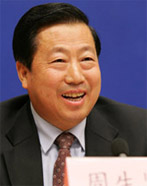 Zhou Shengxian, Minister of Environmental Protection
Zhou Shengxian, Minister of Environmental Protection
"Driving BMWs and drinking polluted water is the bitter irony of our modernization."
Zhou said this to local officials during a field visit to China's southwest Yunnan province.
Key phrase: expanding domestic demand should be parallel to protecting environment
Core concerns: In 2008, the Ministry denied or suspended applications for 156 projects worth over 470 billion yuan involving high-pollution and high energy-consumption. In 2009, will his hardened heart melt as the country unfolds its huge investment projects meant to spur its economy?
 Nie Zhenbang, Director of the State Administration of Grain
Nie Zhenbang, Director of the State Administration of Grain
"On the one hand, we must prevent a shortage in the grain supply because it could spike food prices and threaten our food security; on the other hand, we must prevent a slump in grain prices, which will dampen farmers' enthusiasm and hinder our stable grain production."
At a national grain administration conference on January 12, Nie Zhenbang re-stressed its agency's working guideline--to guarantee an adequate supply of grains and edible oil.
Key phrase: grain security
Core concerns: In 2009, China will face great difficulty in helping its farmers' sell grains and raise their incomes. In addition, foreign funds currently involved in grain circulation want to enter grain production, according to protectionist advocates of the "foreign fund threat theory". China's WTO protection period for agriculture won't extend to 2009.
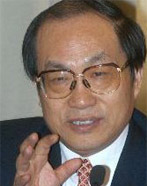 Liu Zhijun, Minister of Railways
Liu Zhijun, Minister of Railways
"The bottleneck in rail transportation will be fundamentally solved by 2012."
At th national railway system conference last December 31, as the central government renewed its zeal to expand domestic demand, Liu Zhijun promised to seize the opportunity to increase investment in railway construction and make it easier for Chinese to buy train tickets.
Key phrase: bottleneck
Core concerns: In 2008, on top of peak season bottlenecks posed to railway transport posed by the Chinese Spring Festival, China's railways also encountered tests from rare snowstorms and severe accidents. The Ministry of Railway has been criticized as China's "last bastion of the planned economy", since a lag in its reform has impeded railway development. However, the Ministry insisted that the source of these problems were long-term under-investment, and that increasing funds in railway construction would eliminate this. As part of the 4-trillion-yuan stimulus package, the central government passed a massive injection of funds that would double railway investment in 2009.
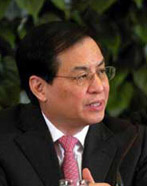 Liu Mingkang, Chairman of China Banking Regulatory Commission (CBRC)
Liu Mingkang, Chairman of China Banking Regulatory Commission (CBRC)
"At present, timely bailout for cash strapped companies may be necessary, but discretion must be exercised."
When presiding over a CBRC-hosted discussion entitled "freeing our minds", Liu Mingkang said firms that have seen healthy performance but still face peril in the following one to two years should be aided.
Key phrase: avoiding risks and bolstering growth
Core concerns: This is the first time that Chinese banking industry has experienced an economic cycle since undergoing shareholding reforms in 2005. In 2009, Chinese banks will seek a balance between bolstering performance and avoiding risk. How to innovate financing and expand financing channels to promote stable and rapid economic growth while controlling risk will be a test for CBRC.
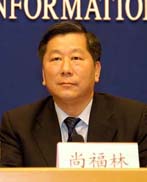 Shang Fulin, Chairman of China Securities Regulatory Commission (CSRC)
Shang Fulin, Chairman of China Securities Regulatory Commission (CSRC)
"Closely stick to the guideline of bolstering growth, expand domestic demand and adjust the economic structure to prop up our national economy's stable and rapid growth."
At a national securities and futures regulation working conference in mid-January, Shang Fulin stressed the need for stable and sound development of the capital markets.
Key phrase: stability
Core concerns: Maintaining stable development is still the CSRC's top priority.
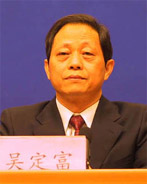 Wu Dingfu, Chairman of China Insurance Regulatory Commission (CIRC)
Wu Dingfu, Chairman of China Insurance Regulatory Commission (CIRC)
"The future development of the insurance industry depends on speedy growth and economies of scale."
At the national insurance regulation conference on December 27, Wu said 2009 would be a hard year for the insurance industry, which should focus on risks in terms of surrendering insurance, insurance fund investment and incapability for compensation.
Key phrase: safety net
Core concerns: In 2009, CIRC will strengthen supervision on the issuance of new insurance products and should work out general requirements for investing in foreign assets and derivatives and detailed rules on the investment of insurance funds.
 Ma Jiantang, Director of National Bureau of Statistics (NBS)
Ma Jiantang, Director of National Bureau of Statistics (NBS)
"When the economy is volatile, it becomes sensitive to small changes in economic data. Therefore, it's important to interpret the data's production process, changes, as well as its underlying reasons."
Ma Jiantang said to journalists last December 22.
Key phrase: accurate interpretation
Core concerns: The NBS said its top priority would still be enhancing the data's quality.
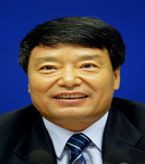 Xu Shaoshi, Minister of Land and Resources
Xu Shaoshi, Minister of Land and Resources
"Land resource administration will likely face "two problems and one concern."
At the National Land and Resource Management Conference on January 15, 2009, Xu Shaoshi warned that on the one hand, reforms have led to a boom in the re-contracting of rural land; on the other hand, cases of illegal use of land would likely rise as local governments increased investment in order to counter the financial crisis.
Key phrase: mission-focused
Core concerns: China's pilot projects to allow the transfer of rural land titles has drawn global attention. The Ministry must show that it can provide enough land to bolster economic growth while safeguarding the bottom-line of 1.8 billion mu of farmland, and that cases of illegal land use can be minimized as local governments scramble to build.
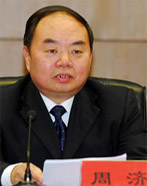 Zhou Ji, Minister of Education
Zhou Ji, Minister of Education
"This government will fulfill the goal of making educational expenditures occupy 4% of its gross domestic product, and increase the fiscal investment in rural areas."
At a press conference held by the State Council Information Office on January 17, 2009, Zhou Ji thus responded to a question about under-investment in education.
Key phrase: educational reform
Core concerns: In 2008, the Ministry of Education began to draft its first medium-and-long term blueprints for reforming China's educational system since entering twenty-first centuries. The blueprint will cover the next 12 years.
The views posted here belong to the commentor, and are not representative of the Economic Observer |
Related Stories
Popular
Briefs
- OPhones to Take on iPhone
- The 3G-enabled Lenovo Mobile OPhone is likely to provide stiff competition to Apple's iPhone in the China market.

- Source:China Mobile
- 6.4-Magnitude Quake Rocks West China
- A 6.4-magnitude earthquake struck China's western Qinghai province earlier this morning.
- Source:China Earthquake Networks Center

- TAX
- Taxing Times
- China's tax bureau aims to collect an additional 100 billion in tax before the end of the ...




















